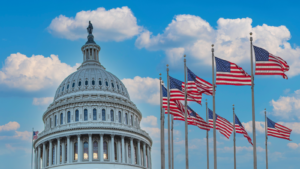State of Justice July 2024: Cases in the Courts
 Criminal Procedure
Criminal Procedure
Iowa: State of Iowa v. White
In a 4-3 ruling, the Iowa Supreme Court ruled that the state’s constitution prohibits virtual testimony in criminal trials. The case revolved around a defendant facing charges of child endangerment who had two children testify against him through a one-way closed video system. The ruling means children in these situations will now have to testify in person.
Michigan: Michigan v. Prude
In a 5-2 ruling, the Michigan Supreme Court set new standards that determine when authorities may consider a person a suspect. The court ruled that a suspect who fled after authorities attempted to detain him had done nothing to suggest he might have committed a crime. As a result, the court ruled that authorities had no basis to attempt to detain him and overturned his convictions for fleeing and resisting arrest.
New Jersey: In Re of Registrant R.H., In Re of Registrant T.L.
The New Jersey Supreme Court agreed unanimously, legislation requiring sex offender registrants to wait 15 years before petitioning to have their name removed from the registry was not intended to include juveniles in that requirement. The ruling will allow future juveniles the ability to petition for their removal from the registry without needing to meet the 15–year requirement.
 Education
Education
Oklahoma: Independent School District No. 12 v. State
The Oklahoma Supreme Court unanimously ruled that the state department of education does not have the authority to force local schools to change the books in their library. The case arose after the Oklahoma State Department of Education ordered a school to remove two books from its library and threatened to rescind the school’s accreditation if it did not comply.
Oklahoma: Drummond v. Oklahoma Statewide Virtual Charter School Board
In a 6-2 opinion, the Oklahoma Supreme Court ruled that a proposed Catholic charter school that would be funded by public education dollars was a violation of the U.S. Constitution, the Oklahoma Constitution, and several state statutes. The ruling blocked what would have been the creation of the nation’s first religious public charter school.
 Environmental Protections
Environmental Protections
The Hawaii Supreme Court unanimously ordered the state water department to restore adequate streamflows to Maui’s Waihee, Waiehu, Wailuku and Waikapu streams, known as Na Wai Eha or the “Four Great Waters.” The court ruled that the four rivers are a critical part of Native Hawaiians’ daily life and the state water department had failed to abide by the state constitution’s requirement that the state protect Native Hawaiians’ traditions and way of life by diverting the streamflows.
 Executive Authority
Executive Authority
Florida: Worrell v. DeSantis
In a 6-1 decision, the Florida Supreme Court denied a state attorney’s petition for reinstatement to her job after Monique Worrell was removed from office last year by Gov. Ron DeSantis (R), who disagreed with the state attorney, who was a Democrat, about whether to bring some cases to trial. DeSantis has appointed five of the court’s seven justices. The ruling’s lone dissenter, Justice Jorje Labarga, is one of the two non-DeSantis appointees, and wrote that state attorneys need discretion to address the issues of their districts. It is the second case in which the court has upheld DeSantis’s firing of a Democratic state attorney.
 Firearm Restrictions
Firearm Restrictions
Washington: State of Washington v. Gator’s Custom Guns, Inc.
The Washington Supreme Court upheld a temporary ban on the sale of high-capacity magazines until the conclusion of litigation to determine whether the ban violates the Second Amendment.
Housing Rights 
Washington: Potter v. Lacey
The Washington Supreme Court decided ruled that a municipal ordinance that restricted public parking of recreational vehicles to four hours was constitutional, ruling the law did not affect the plaintiff’s right to travel and live as he chooses. The case will continue to the 9th Circuit to determine whether the law violates Fourth Amendment.
 LGBTQ+ Rights
LGBTQ+ Rights
Texas: Texas v. Loe
In an 8-1 ruling, the Texas Supreme Court upheld the state’s law banning gender affirming care for transgender children. Approximately 29,000 Texas children aged 13-17 who identify as transgender will lose access to gender affirming care because of the ruling. Justice Debra Lehrman, the ruling’s lone dissenter, wrote that the law illegally takes the rights of Texans parents to choose medical care for their children.
New York: Byrnes v. Senate of the State of New York
The New York Court of Appeals affirmed a lower court ruling that dismissed a challenge to a proposed constitutional amendment aiming to ban discrimination based on gender, gender identity, age, sex, national origin, disabilities, ethnicity, gender expression, pregnancy, pregnancy outcomes and reproductive health care and autonomy. The court found that challengers lacked standing, allowing the proposal to be placed on the ballot this fall. The New York Constitution currently bans discrimination based on race, color, creed or religion.
 Public Records Access
Public Records Access
Louisiana: People for the Ethical Treatment of Animals v. Board of Supervisors of Louisiana State University
In a split ruling, the Supreme Court of Louisiana ruled that the public has a right to view documents that are not explicitly protected under public records laws, strengthening such laws in Louisiana. Prior to the court’s ruling, public entities could use discretion to decide which documents to disclose in a public records request.
 Reproductive Rights
Reproductive Rights
Kansas: Hodes & Nauser, MDS, P.A. v. Kobach, Hodes & Nauser, MDS, P.A. v. Stanek
The Kansas Supreme Court affirmed that the right to an abortion is enshrined in the state’s constitution in two 5-1 rulings that blocked the enforcement of a law prohibiting second trimester abortion procedures and a 2015 law that attempted to change licensing requirements for clinics that provide abortions.
 Statutory Interpretation
Statutory Interpretation
Missouri: State of Missouri v. Young
The Missouri Supreme Court affirmed a lower court’s ruling that determined a man who had pled guilty to a felony assault charge was not eligible to seek a seat on his county’s commission despite having received a pardon. The court’s decision relied on its interpretation of the legislature’s phrasing in the relevant statute to explicitly prohibit anyone who has pled guilty to a felony from seeking public office regardless of the status of their conviction.
New Hampshire: State of New Hampshire v. Diole
The New Hampshire Supreme Court upheld a lower court ruling that found a criminal defendant’s involuntary civil commitment was not a due process violation. Lower courts found the defendant was incompetent to stand trial on four counts of felonious sexual assault and had upheld his civil commitment on the grounds that he was an unacceptable danger to the public. The Supreme Court ruled that being found incompetent is not the same as being charged with a crime and does not afford the same due process protections.
 Voting Rights
Voting Rights
Wisconsin: Priorities USA v. Wisconsin Elections Commission
In a 4-3 party ruling, the court overturned its previous decision prohibiting the use of ballot drop boxes, reinstating the ability of election clerks to use drop boxes across the state in this fall’s elections. The ruling faced criticisms from conservatives who said stare decisis should have stopped the liberal justices from overturning such a recent ruling.
Delaware: Albence v. Mennella
In a unanimous ruling, the Delaware Supreme Court reversed a lower court ruling that found absentee voting laws were unconstitutional. The court heard the case on an expedited basis to resolve the issue before this fall’s elections. The court ruled the plaintiffs lacked standing, making absentee and early voting available to voters this fall.

